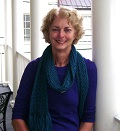Dr. Finnan teaches for the Sociology/Anthropology and Teacher Education Departments.
How long have you been teaching at CofC?
I came to CofC in 1993 but was originally not on a faculty line. I was director of the South Carolina satellite center for a national school reform model that was developed at Stanford University – the Accelerated Schools Project. I moved to a faculty line in Teacher Education in 1997 and assumed a joint appointment with Anthropology in 2008.
What were you doing before coming to CofC?
I worked as a researcher for the Accelerated Schools Project at Stanford University.
Where did you study and what inspired you to study anthropology and become a professor?
My studies have been varied. I studied folklore and anthropology as an undergraduate at UC Berkeley and a master’s student at University of Texas, Austin. I became interested in studying children’s play. When I started a PhD program in Education and Anthropology at Stanford, my initial interest was seeing how children use play to accommodate to a new culture. At the time refugees from Vietnam were coming in large numbers to the San Francisco Bay Area so I did a small study on Vietnamese children’s playground behavior. My work with the refugees made me increasingly interested in the issues adults face, and I changed my focus to studying adults in job training. After finishing my degree I worked in several non-faculty positions, but it was always my dream to become a college faculty member. I jumped at the chance at CoC.
Are you involved in any research at the moment? If so, what is it about?
I just returned from the most amazing research opportunity of my long career. With funding from the College and from the Fulbright/Nehru Commission, I spent six months in Bhubaneswar India at the Kalinga Institute for Social Sciences (KISS), a residential school providing free education, room, board, and medical care to 25,000 very poor tribal children. I wanted to find out how they organize a school for so many children, how to best describe the school’s culture, what effect attending the school has on the children and their families, and if we can draw policy lessons from this school. I have analyzed over 140 interviews and reviewed my field notes and am now trying to write up the findings. *Dr. Finnan will be giving her sabbatical talk on October 16 at 12pm in Alumni Hall, 86 Wentworth Street.*
What is your favorite class to teach?
I love to teach ANTH 205: Language and Culture! It allows us to talk about so many different interesting things and to see connections between culture, cognition, and language. I also love to teach Anthropology and Education and Anthropology of Childhood. I’m looking forward to teaching ANTH 201: Cultural Anthropology in the spring.
What was your favorite class when you were in school?
I really loved my folklore courses.
Do you have any advice for current or prospective anthropology students?
I think that anthropology is a perfect undergraduate major. It teaches you to think broadly and to synthesize material from many different fields. Most importantly, it helps us see the effect of culture on how everyone, ourselves included, view and experience the world.
What do you like to do outside of teaching?
I love to practice yoga, take my dog to the beach every Sunday morning, enjoy conversations with my husband over dinner, spend time with my daughters and my new granddaughter, I also like to play around with fabric art – my latest is taking children’s drawings and making quilts based on them.
Are you reading anything interesting at the moment?
I’m between books now – I really enjoyed Euphoria by Lily King. It’s a fictional account of when Margaret Mead and Gregory Bateson met in New Guinea.
